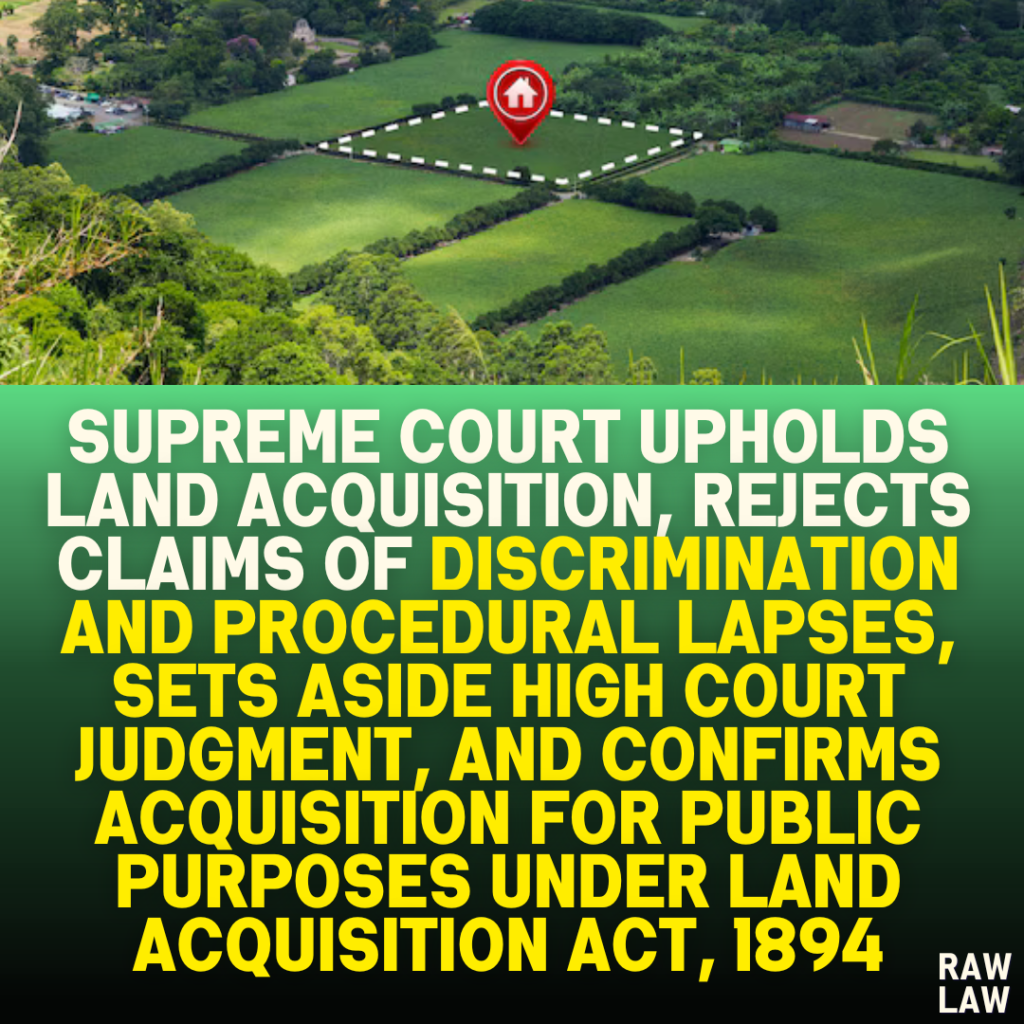Court’s Decision:
The Supreme Court allowed the appeals filed by the Haryana Urban Development Authority (HUDA), setting aside the Punjab and Haryana High Court’s judgment that had quashed the notifications issued under Sections 4 and 6 of the Land Acquisition Act, 1894. The Court held that the acquisition of land, including unauthorized structures, was lawful and necessary for public purposes, and the government’s decision was in the public interest.
Facts:
The Haryana Government issued a notification in 1999 to acquire 952.18 acres of land in Panchkula for residential, commercial, and recreational purposes. The respondents, whose land was part of this acquisition, objected, claiming their land contained authorized structures and should be exempt from acquisition. Despite these objections, the acquisition continued. The High Court later quashed the acquisition notifications, siding with the respondents, who argued that similar land owned by others had been exempted.
Issues:
- Whether the acquisition complied with Section 5A of the Land Acquisition Act, 1894.
- Whether the landowners were treated unfairly compared to other similarly placed landowners.
- Whether the settlement between the parties affected the appeals’ outcome.
- Whether the doctrine of merger applied, given the dismissal of earlier state appeals.
Petitioner’s Arguments:
The petitioners (HUDA) argued that:
- The respondents’ constructions were unauthorized as no building plan had been submitted.
- The High Court incorrectly quashed the acquisition based on unverified discrimination claims.
- The land acquisition was critical to public development and was consistent with the state’s development plans.
Respondent’s Arguments:
The respondents argued that:
- Their objections under Section 5A were not properly considered.
- The government discriminated by exempting other similarly situated lands.
- A subsequent settlement with the state should lead to the release of their land from acquisition.
Analysis of the Law:
The Court clarified that Section 5A of the 1894 Act codifies the right of landowners to object to acquisition. However, the Collector’s recommendation is not binding on the government, and the state can independently evaluate the situation and make a final decision. The Supreme Court held that the government followed the necessary procedures and that there was no violation of Section 5A.
Precedent Analysis:
The Court referred to State of Haryana v. Vinod Oil & General Mills, where it was held that authorized constructions do not preclude land acquisition for public purposes. The Court reiterated that public interest must prevail over private interests, even if the land contains authorized structures.
Court’s Reasoning:
The Court found that the respondents failed to prove any procedural lapses in the acquisition process. It also noted that the High Court erred in its finding of discrimination, as the land allegedly exempted had subsequently been acquired. Moreover, the state was justified in proceeding with the acquisition as the constructions were unauthorized, and the acquisition was necessary for the development of the area.
Conclusion:
The Supreme Court allowed the appeal, setting aside the High Court’s decision. It upheld the acquisition of the land, stating that the acquisition process was lawful, in public interest, and complied with the provisions of the Land Acquisition Act.
Implications:
The ruling affirms the government’s authority to acquire land for public purposes, even when it contains unauthorized constructions. It underscores the importance of following legal procedures in land acquisition and reinforces that public interest should outweigh individual objections.




Pingback: High Court of Jammu & Kashmir Dismisses Benami Suit as Time-Barred, Upholds Rejection of Plaint for Deficient Pleadings Under Order 7 Rule 11 CPC - Raw Law
Pingback: Bombay High Court Denies Pre-Emption Rights in Property Dispute Due to Appellants’ Ineligibility as Class-I Heirs Under Hindu Succession Act; Orders Partition with Constructed Area Reserved for Residency and Expedites Execution - Raw Law